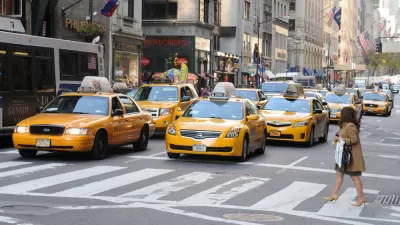Americans are less mobile than they were decades ago and it's unclear why. Possible explanations include the recession, habits based on family make-up, as well as telecommuting and job trends, but none of these proposed reasons can be easily proven.
According to recently released U.S. Census data [PDF] from the Current Population Survey, American mobility rates are at an all time low. “About 100 million people (aged 5 and up) lived in a different home or apartment in 2010 than they did in 2005” reports Eric Jaffe, “[b]ut that total is down from 107 million movers between 2000 and 2005, and the latest mobility rate is 10 points off the peak rate back in the mid-1970s.” The Census explains who is moving and where they are moving to, but not why.
"At the Conversable Economist, Timothy Taylor points us to a 2011 study that found America's declining mobility to be a bit of an ongoing mystery. That study considers a number of theories, but finds each of them flawed. It concludes [PDF]: "By most measures, internal migration in the United States is at a 30-year low. Migration rates have fallen for most distances, demographic and socioeconomic groups, and geographic areas. The widespread nature of the decrease suggests that the drop in mobility is not related to demographics, income, employment, labor-force participation, or homeownership."
"At the end of the day, writes Taylor, Americans might just be 'shifting their preferences away from being willing to move.'"
FULL STORY: The Mystery of Our Declining Mobility

Alabama: Trump Terminates Settlements for Black Communities Harmed By Raw Sewage
Trump deemed the landmark civil rights agreement “illegal DEI and environmental justice policy.”

Study: Maui’s Plan to Convert Vacation Rentals to Long-Term Housing Could Cause Nearly $1 Billion Economic Loss
The plan would reduce visitor accommodation by 25% resulting in 1,900 jobs lost.

Planetizen Federal Action Tracker
A weekly monitor of how Trump’s orders and actions are impacting planners and planning in America.

Waymo Gets Permission to Map SF’s Market Street
If allowed to operate on the traffic-restricted street, Waymo’s autonomous taxis would have a leg up over ride-hailing competitors — and counter the city’s efforts to grow bike and pedestrian on the thoroughfare.

Parklet Symposium Highlights the Success of Shared Spaces
Parklets got a boost during the Covid-19 pandemic, when the concept was translated to outdoor dining programs that offered restaurants a lifeline during the shutdown.

Federal Homelessness Agency Places Entire Staff on Leave
The U.S. Interagency Council on Homelessness is the only federal agency dedicated to preventing and ending homelessness.
Urban Design for Planners 1: Software Tools
This six-course series explores essential urban design concepts using open source software and equips planners with the tools they need to participate fully in the urban design process.
Planning for Universal Design
Learn the tools for implementing Universal Design in planning regulations.
Caltrans
Smith Gee Studio
Institute for Housing and Urban Development Studies (IHS)
City of Grandview
Harvard GSD Executive Education
Toledo-Lucas County Plan Commissions
Salt Lake City
NYU Wagner Graduate School of Public Service





























